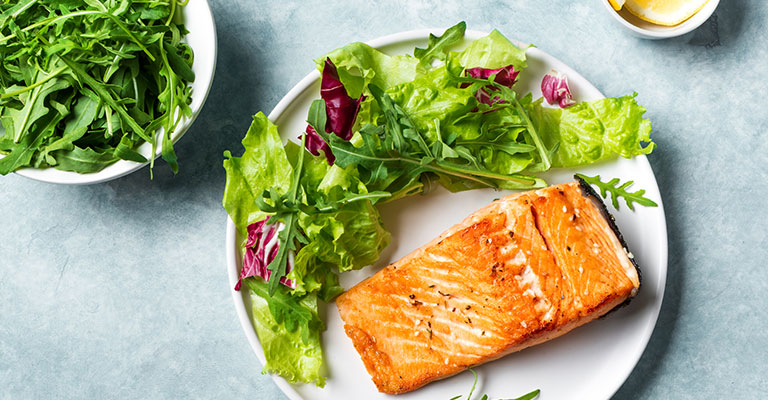Updated by the Progyny Clinical Team — June 2025
Finding the best foods for you can be difficult, but when you have a hormonal disorder or a disease it can be even more complicated. Then add trying to conceive on top of it. So how do you make sure you’re living a healthy lifestyle? We’ve broken down what foods to avoid and what to eat if you have polycystic ovary syndrome (PCOS).
What is PCOS?
PCOS is a hormone disorder where the body makes too many androgenic hormones. It often causes enlarged ovaries with small cysts, which is where the name comes from. These hormonal changes can lead to a lack of periods or longer time between periods, as well as infertility.
PCOS is also known to be a metabolic disorder with a level of insulin resistance for most patients. Because it involves insulin resistance and metabolism, diet and exercise changes are an important step in its treatment — more on this later. For those with PCOS who are overweight, weight loss has been shown to improve PCOS symptoms and fertility. Learn more about PCOS.
Foods to avoid
- Excess added sugar both disrupts hormone balance and triggers an inflammatory response in the body. Inflammation is one of the primary causes of insulin problems, hormone imbalance, and PCOS.
- Highly processed carbs, such as white bread, potato chips, and other highly processed foods should be avoided. Since these are rapidly processed in the body, like excess sugar, the same hormone and inflammation issues mentioned above may happen.
- Seed oils are common in processed foods and restaurant cooking because they’re cheap and have a neutral taste, so they work in almost any dish. Vegetable oils like soybean, canola, rapeseed, sunflower, and safflower mostly contain omega-6 fats, which can lead to inflammation. Avoid these fats by cooking with coconut oil, olive oil, or ghee (which is clarified butter) at home.
- As with most things we eat, moderation is best. While the above things may remain part of your diet, try to avoid excess and make healthy choices when possible.
So, what should I eat?
- Leafy greens such as kale and spinach are rich in vitamin B and minerals like calcium. They can play a key role in regulating sugar, hormones, thyroid function, and fat metabolism.
- Healthy fats can help balance hormones and encourage fertility. These fatty acids can be found in avocados, nut butters, chia seeds, extra virgin olive oil, and fatty fish, like wild salmon when possible.
- Immune system boosters, like ginger and garlic, are known to promote good immunity.
- Foods that support liver health include beets, lemons, limes, cabbage, and carrots.
Summary
It’s important to note that each person is unique in how they tolerate certain foods. Get the best suggestions for you from your reproductive endocrinologist or healthcare provider.
While not food related, it’s also good to get rid of toxic household and personal care products when dealing with any sort of hormone imbalance. There are many non-toxic brands to choose from.
Progyny is here for you. If you have any questions, please contact your Progyny Care Advocate for support.
Disclaimer: The information provided by Progyny is for educational purposes only and is not medical advice. Always consult a qualified healthcare provider for medical guidance.
